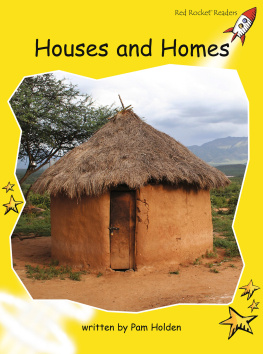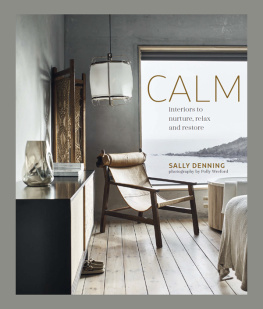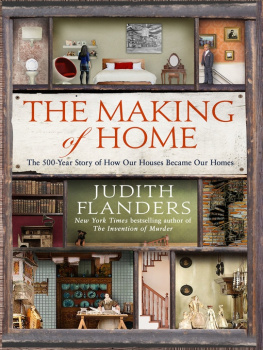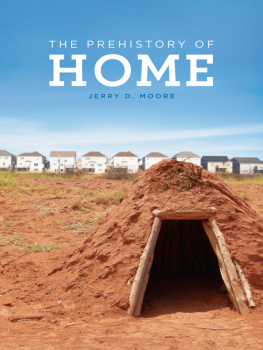The Meaning of Home
Edwin Heathcote

First published in 2012
by Frances Lincoln Ltd, 7477 White Lion Street, London N1 9PF
www.franceslincoln.com
This eBook edition first published in 2014
The Meaning of Home
Copyright Edwin Heathcote 2012, 2014
All rights reserved
This eBook is copyright material and must not be copied, reproduced, transferred, distributed, leased, licensed or publicly performed or used in any way except as specifically permitted in writing by the publishers, as allowed under the terms and conditions under which it was purchased or as strictly permitted by applicable copyright law. Any unauthorised distribution or use of this text may be a direct infringement of the authors and publishers rights, and those responsible may be liable in law accordingly
A catalogue record for this book is available from the British Library
eBook conversion by Quayside Publishing Group
Digital edition: 978-1-7810-1165-2
Softcover edition: 978-0-71123-377-5
CONTENTS
INTRODUCTION: HOME IS WHERE THE HEART IS
W HAT DOES A HOME MEAN? It might sound a stupid question, the very idea of home is so tied up with our selves that it can seem almost inseparable from our being. We fear the idea of homelessness, it means a life on the streets, of not having a place to sleep, to eat, to be. Our home is our base, a place that roots us to the earth, to the city or the landscape; it gives us permanence and stability and allows us to build a life around it and within it. When we are away from it we pine, we are homesick. We have learned to dimly despise the non-places of airports and offices, of malls and motorways, places that are everywhere and nowhere, places that are globally familiar and unnervingly similar. We yearn to return to the familiar rootedness of our sofas and our own beds, places with which we are comfortable and in which we feel we are safe.
Then again, we have also been persuaded that our homes are assets, that they are our pensions and our financial security for an uncertain future, that we ought to be part of a home-owning democracy. Our homes have been turned into political tools it is the spectre of homelessness that keeps us working and our mortgages which chain us to our work and allow us to live in a state of insistent mild fear. A home can be an asset and it can be a burden, a place of comfort and a weight around our necks. A mortgage is literally a pledge to death.
But beyond the obvious, beyond the idea of the home as a refuge and a focus for family life, what does it mean? Martin Heidegger proposed that the building of a house and the idea of dwelling on the earth were fundamentally connected. The German word for building, bauen (as in Bauhaus), and the English word being share the same root. The etymology survives in English only in the word neighbour from the High German and Old English for nigh or near dweller. To build, it seems, is to be. Carl Jung similarly stressed the intimate association of the house with the self when he analysed a dream he himself had had while on a 1909 voyage to the US with Sigmund Freud. He described a dream of being in a house that was obviously my house yet with which he was unfamiliar and through which he set on a journey of discovery, from its Rococo upper floors, its medieval ground floor to its dark Roman cellars. In analysing his own dream, Jung came to his hugely influential idea of a collective unconscious, that this house represented something that went beyond his personal experience and descended into a universal well of consciousness that pervades the minds of all mankind. The house, Jung proposed, was a model of the mind.
When the Roman orators looked for a way of organizing their knowledge and their rhetorical devices, they too looked to the house. They created memory palaces in which facts were placed in rooms, given physical locations within a real and remembered or imagined house. The mind, it seems can retain huge amounts of information if it is associated with architectural locations in a house, or a palace.
The idea of the house is also deeply entwined not only with our language but in its very building blocks, the alphabet. To the Cretans, the aleph was an ox (turn the capital A upside down and you can see a head with two horns), although in the Kabbalah tradition it is the mystical origin of everything, the number that contains all others. When Jorge Luis Borges wrote his remarkable short story The Aleph, however, it had transformed into a point in a cellar below the house of the useless poet Daneri, from which every other moment in time and space can be seen, an infinity compressed into a pinpoint, a singularity. The house is ultimately demolished though the suggestion is that this aleph might not be the only one. This extraordinary fiction, the idea that a cellar could contain a point of infinity, seems to reflect Jungs dream of his cellar, the archaeology of the mind.
The second component of the word alphabet, beta, derives directly from the word Beth, or house, a word which survives in Hebrew. The Cretan pictograph depicts a house with a simple triangular pitched roof, the kind drawn by almost any child. The early Greeks abstracted this symbol so that it became a double roof on its side, which in turn became the familiar double dome on our B. Delta, meanwhile, a triangle, represented a door (daleth in the early Semitic languages, and Delet is a door in modern Hebrew). The triangle presumably depicts an opening in a tent. Meanwhile, the Semitic He, which became epsilon, our E, represented a latticed window. Add a vertical line to the right of the letter and you can see the familiar shape of a sash window a simplification but a useful one. Then there is Waw or Vav, which evolved into our F, the pictograph being a tent-peg or hook, the form of which can still be seen in our letter, just as we can still see the form of a section of fence in our H, which derives from the Semitic Heth, meaning a fence or barrier it is also incidentally related to the Phoenician Hasir, our courtyard.
The centrality of the house to the development of language indicates the depth to which the form of the dwelling is embedded in our culture and in our most basic tools of communication.
Nevertheless, Jungs idea of a collective unconscious remains controversial. Do we all really have within us a reservoir of symbols and archetypes that have survived and thrived through our species for millennia? Is the house an expression of a series of elements which allows us to root ourselves not only to a fixed place in a world of flux and insecurity but in a continuum of historical allusion and metaphor, a system of signs and symbols built up to become part of a folk consciousness we dont even realize we have? The very idea of a collective consciousness is fraught with the potential for dangerous deviation. Many of the authors whose work represents the most articulate espousal of these ideas drifted conspicuously to the right. Heidegger was famously a member of the Nazi party from an early date. The Romanian scholar Mircea Eliade, whose explorations of ritual and meaning in building and the perception of space notably The Sacred and the Profane (1957) are among the finest there are, was similarly tainted by his outspoken support of the savage Iron Guard. The idea of a cultural lineage expressed through an existential architecture can easily elide into a kind of nationalist dogma, the kind of medieval mythologizing the Nazis were over-fond of. But those associations shouldnt be allowed to spoil the notion that the things that surround us can be containers of meaning. We must attempt to circumvent the national and the local and to consider not just mythology, superstition and folklore but the wider cultural world of film and literature, TV, videos, comics and pop-dream interpretation, alongside psychology, sociology and fairy tales. These images and ideas saturate our culture and create for us a world of meaning if we are only dimly aware of it.








